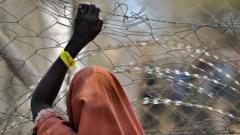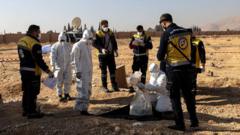Human rights groups are expressing alarm over the safety of refugees in Kenya, as incidents involving forced expulsions and alleged government complicity with foreign agents raise concerns about the nation’s commitment to the protection of vulnerable populations. Once a beacon of stability in East Africa, recent actions suggest a departure from established norms that safeguard asylum seekers.
Kenya's Changing Refugee Landscape: Concerns Over Safety and Diplomatic Dilemmas

Kenya's Changing Refugee Landscape: Concerns Over Safety and Diplomatic Dilemmas
As Kenya faces criticism for recent forced expulsions of refugees, particularly in light of political pressures, the country's reputation as a safe haven is increasingly in jeopardy.
Since the onset of escalating political turmoil and conflict in various parts of the world, Kenya has long been heralded as a vital refuge for those fleeing persecution and violence. However, recent events reveal a troubling downturn in the country’s treatment of refugees, raising alarms among rights organizations and international observers.
Reports indicate that over 3,000 refugees are currently under threat in Kenya, after they were subjected to forced expulsions amid political pressures from governments such as Turkey. Most notably, the abduction of four Turkish refugees by masked men in Nairobi has drawn widespread condemnation. These individuals, recognized by the UN as refugees, were reportedly handed over to the Turkish authorities, who seek them on charges of treason in connection to a movement associated with self-exiled cleric Fethullah Gulen.
Critics argue that such actions violate the principle of "non-refoulement," which prohibits the return of individuals to countries where they may face danger. Kenyan officials maintain that handling such sensitive situations requires a delicate balancing act to maintain vital diplomatic relationships, particularly with Turkey, which recently strengthened ties through a military cooperation agreement.
Kenya's refugee commissioner, John Burugu, chose to remain silent on the deportations, while senior foreign ministry official Korir Sing'oei emphasized the complexity of the situation, acknowledging the humanitarian implications of detaining individuals that have been characterized as subversive.
The deteriorating safety of refugees in Kenya has been underlined by various troubling incidents. International media reports have highlighted cases of abduction by unidentified persons, the lack of due process in deporting individuals to their countries of origin, and an increase in cooperation between Kenyan police and foreign security agencies. The actions raise ethical questions about Kenya’s commitment to international refugee laws and its status as a welcoming destination.
Among those at risk are individuals like South Sudanese refugee Mabior Awikjok Bak, who was taken from Nairobi and now faces arbitrary detention back home, and Pakistani journalist Arshad Sharif, who was shot dead by police under suspicious circumstances. The chilling accounts of these refugees illustrate a growing climate of fear and uncertainty in the country that was once seen as a haven.
The broader implications of these developments are compounded by the fears expressed by refugees regarding their safety in Kenya. A Rwandan refugee, formerly active in anti-government circles, explained that he lives under the constant threat of being tracked down by officials from his home country, leading to a reliance on aid organizations for support.
As Kenya grapples with external pressures and the consequences of its decisions regarding refugees, its international image is at risk. The events surrounding the forced repatriation of refugees have left many questioning the country’s dedication to upholding the principles of asylum and protection for individuals fleeing from perilous circumstances in their home countries. The future for Kenya as a refugee destination remains uncertain, as both its domestic policies and international obligations come into play.



















